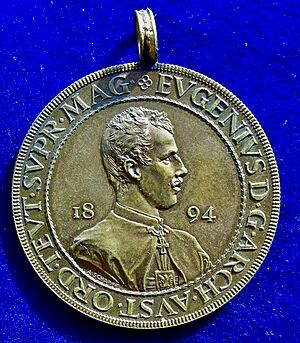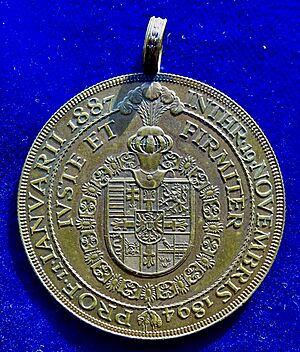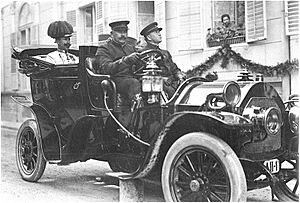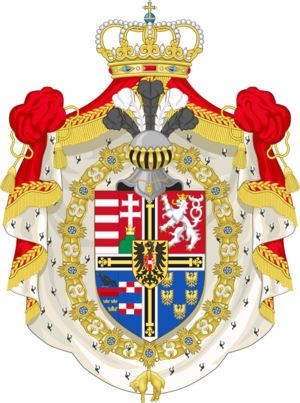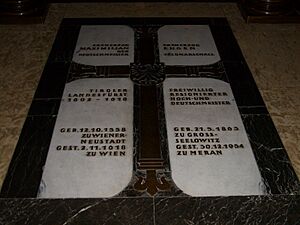Archduke Eugen of Austria facts for kids
Quick facts for kids Archduke Eugen |
|
|---|---|
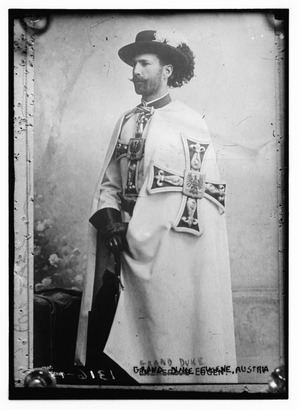 |
|
| Born | 21 May 1863 Gross-Seelowitz, Moravia, Austrian Empire |
| Died | 30 December 1954 (aged 91) Merano, Italy |
| House | Habsburg-Lorraine |
| Father | Archduke Karl Ferdinand of Austria |
| Mother | Archduchess Elisabeth Franziska of Austria |
Archduke Eugen Ferdinand Pius Bernhard Felix Maria of Austria-Teschen (born May 21, 1863 – died December 30, 1954) was an Archduke of Austria. He was also a prince of Hungary and Bohemia. He was the very last Grand Master of the Teutonic Order from the famous Habsburg family.
Early Life and Training
Eugen was born at Gross Seelowitz castle in Moravia (which is now Židlochovice in the Czech Republic). His parents were Archduke Karl Ferdinand of Austria and Archduchess Elisabeth Franziska of Austria. He was given many names at his baptism, including Eugen.
His education was quite strict and focused. He spent time living in the countryside and on holidays. But he also received a strong education, including military training.
At the Archduke Albrecht's Palace in Vienna, Eugen learned about military subjects. He also studied languages, music, and art history. When he was 14, he began his military journey. This was a family tradition. He joined the Tyrolean Kaiserjäger Regiment as a young officer called a Leutnant.
Soon after, he moved to a hussar (cavalry) regiment. He took part in many large military training exercises. In 1882, Eugen passed a special test. This allowed him to attend the military academy in Wiener Neustadt. He was the only archduke to complete this tough several-year course. He graduated as a fully trained general staff officer. This meant he was ready to help plan and lead armies.
Military Career
In 1885, Eugen joined the Austro-Hungarian General Staff. This is like the main planning group for the army. He quickly moved up in rank. He led a group of soldiers called a battalion. Then he took command of an entire regiment as a colonel.
After leading another cavalry regiment, he commanded an infantry brigade in Olmütz. Later, he led a larger group of soldiers called a division in Vienna. By 1900, he was in charge of the XIV Army Corps in Innsbruck. He was promoted to General der Kavallerie (General of the Cavalry). This also made him the top commander in Innsbruck and the defense chief for the Tyrol region.
Eight years later, he became an army inspector. He was also the senior defense commander for the Tyrol. In 1909, when there was talk of war with Serbia, he was considered a possible army commander.
Eugen also had a say in who got important jobs. He strongly suggested that Franz Conrad von Hötzendorf become the new chief of the general staff. In 1911, Archduke Eugen left active military service. Some say it was for health reasons. Others believe it was because another archduke, Archduke Franz Ferdinand of Austria, felt jealous of Eugen's importance.
Besides his military work, Eugen had an important duty as the Grand Master of the Teutonic Order. This was a very old religious and military order. In 1887, Eugen joined the order as a knight. He was also chosen to help his uncle, Archduke Wilhelm Franz of Austria, who was the Hoch- und Deutschmeister (Grand Master).
When his uncle died suddenly, Eugen became the new Grand Master in 1894. He was very good at this job. He helped improve nursing care and founded new hospitals. He also made sure the order's historical records in Vienna were organized.
World War I
When First World War began, Eugen immediately wanted to serve. At first, he was given a less important role. But in December 1914, he was sent to lead the forces in the Balkans. His headquarters were in Petrovaradin.
Working with his chief of staff, Alfred Krauss, Eugen reorganized the 5th Army, which had been badly affected by fighting.
On May 22, 1915, Eugen was promoted to Generaloberst (a very high general rank). Two days later, he was put in charge of the southwestern front against Italy. His headquarters moved to Marburg (Maribor). He now commanded a huge area from the Swiss border all the way to the Adriatic Sea. His main goal was to defend against the Italian forces, who often had more soldiers.
During the First Battle of the Isonzo, Eugen traveled often behind the front lines. He attended many meetings and visited the troops. He encouraged them and became very popular. He also managed the areas behind the front to make sure the soldiers had enough supplies.
In the spring of 1916, there was a big attack planned from South Tyrol. Eugen took command of the 11th and 3rd armies for this. The attack started well, but it had to stop. This was because of a new threat on the Russian front. Many soldiers had to be moved there. After stopping the attack, Archduke Eugen successfully moved his troops back to safe positions.
As the war continued, Eugen had to send more and more of his soldiers to the intense fighting at the Isonzo River. This meant he had very few reserve troops left in his own area. Even with limited forces, he never thought about pulling back further. He felt a strong personal connection to the land.
Eugen was promoted to Field Marshal on November 23, 1916. In March 1917, he again took up his role as commander of the southwest front. During the Battle of Caporetto, Eugen was the main commander. He put all his energy into it. He knew this was the last good chance for the Central Powers to win.
On December 18, 1917, Emperor Karl removed Eugen from active service. This was against the wishes of the chief of the general staff. The southwestern front command was ended. Eugen's removal was likely due to changes in the war. After Russia left the war, other fronts became shorter. With his very high rank, Eugen could only be a commander-in-chief. Emperor Karl decided to take supreme command himself, so Eugen had to leave.
Eugen was still highly respected. At the end of the war in November 1918, some people suggested he become a regent (someone who rules when the king or queen cannot). However, Eugen would not have accepted this without the emperor's approval.
Military Awards
Archduke Eugen received many awards from Austria-Hungary and other countries. Here are some of the most important ones:
- Knight of the Order of the Golden Fleece (1878)
- Grand Master of the Teutonic Order (1894)
- Military Merit Cross (1898)
- Grand Cross of the Royal Hungarian Order of St. Stephen (1911)
- Grand Cross of the Military Order of Maria Theresa (1917)
- Royal Prussian Iron Cross 1st and 2nd Classes (1915)
- Royal Prussian Order Pour le Mérite (1916)
Later Life
After the Austro-Hungarian monarchy ended, Eugen first lived in Lucerne and then in Basel, Switzerland. He lived simply in a hotel from 1918 to 1934. To protect the Teutonic Order, Eugen willingly stepped down as Grand Master in 1923. He was the last Grand Master from a royal family. This action helped save the order's properties.
In 1934, Eugen moved to the order's convent in Gumpoldskirchen near Vienna. He attended royal gatherings and veteran meetings. He continued to support his family's dynasty, even though he didn't expect the monarchy to be restored. When Austria joined Germany in 1938 (an event called the Anschluß), the Teutonic Order was dissolved. Its properties were taken by the government.
Eugen received a rented house in Hietzing, likely with help from important military figures. He survived Second World War there. In 1945, he fled to the Tyrol region. The French occupying forces gave him a small rented villa in Igls. On May 21, 1953, the city of Innsbruck celebrated his 90th birthday.
Archduke Eugen died on December 30, 1954, in Merano, Italy. He was the oldest living member of his family at the time. He was surrounded by brothers of his order from Lana. On January 6, 1955, he was buried in the St. Jakobskirche in Innsbruck. He rests next to Archduke Maximilian III (1558–1618).


